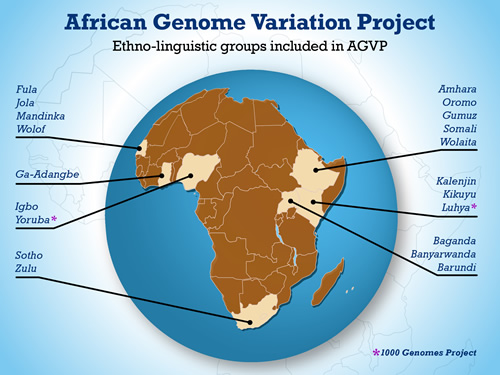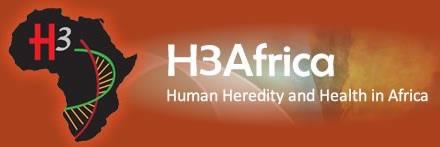Last updated: April 07, 2015
Genomics in Africa
Genomics in Africa
March 3, 2015
Roughly 100,000 years ago, humans migrated out of Africa and started to populate the globe. Although the human species is now associated with significant phenotypic variation, all humans have a genetic origin in Africa. The genomes of people currently living in Africa are more varied than those of people living anywhere else on Earth. Studying the genomes of Africans thus offers important opportunities to characterize and understand genomic variation. Despite this, Africans are largely underrepresented as both research participants and scientists in genetics and genomics.
 To fully capture the genetic and genomic legacy of humanity, it is essential to include representatives of African populations in studies of human genomic variation. It is also critical that the benefits of genomic advances be felt throughout the world by patients, health professionals, researchers and scientists. Accordingly, NHGRI aims both to increase the use of African populations in genomic studies and to stimulate genomics research in Africa. This is being accomplished in multiple ways, a few of which are highlighted below.
To fully capture the genetic and genomic legacy of humanity, it is essential to include representatives of African populations in studies of human genomic variation. It is also critical that the benefits of genomic advances be felt throughout the world by patients, health professionals, researchers and scientists. Accordingly, NHGRI aims both to increase the use of African populations in genomic studies and to stimulate genomics research in Africa. This is being accomplished in multiple ways, a few of which are highlighted below.
Building on the success of the HapMap Project, the aim of the 1000 Genomes Project is to discover and catalog human genomic variants across the world's populations and to support studies relating those variants to health and disease. As a centerpiece of this effort, researchers have now sequenced the genomes of thousands of people in Africa, Europe, East Asia, South Asia and the Americas. This project represents a collaboration involving researchers from the United States, the United Kingdom, China and Germany.
 Recently, Dr. Charles Rotimi of the NHGRI Intramural Research Program and his colleagues in the African Genome Variation Project published the first comprehensive characterization of genomic diversity across sub-Saharan Africa. This study, which used data generated by the HapMap and 1000 Genomes Projects, uncovered evidence of how environmental forces (e.g., climate and exposure to infectious agents) have shaped the genomes of Africans and influenced susceptibility to conditions such as malaria, Lassa fever and trypanosomiasis.
Recently, Dr. Charles Rotimi of the NHGRI Intramural Research Program and his colleagues in the African Genome Variation Project published the first comprehensive characterization of genomic diversity across sub-Saharan Africa. This study, which used data generated by the HapMap and 1000 Genomes Projects, uncovered evidence of how environmental forces (e.g., climate and exposure to infectious agents) have shaped the genomes of Africans and influenced susceptibility to conditions such as malaria, Lassa fever and trypanosomiasis.
The Human Heredity and Health in Africa (H3Africa) Initiative is jointly funded by the National Institutes of Health (NIH) (through the NIH Common Fund) and the U.K. Wellcome Trust. NHGRI plays a major leadership role in the program, which aims to use genomics to study the genetic and environmental determinants of disease in Africa. H3Africa supports studies led by African scientists that use genomic, clinical and epidemiologic methods to identify hereditary and environmental contributions to the risk of common, non-communicable disorders (such as heart and kidney disease), as well as communicable diseases (such as tuberculosis).
 An important goal of H3Africa is to increase direct funding available to African scientists, so as to foster genomics research on the continent. This is being accomplished through numerous research projects, collaborative centers, and studies focusing on relevant ethical, legal and societal issues. The development of suitable infrastructure is also essential for establishing a sustainable genomics research base in Africa. H3Africa is funding grants for the collection and banking of research specimens through biorepository research projects, as well as grants for the development of computing capabilities through the H3ABionet. With the increase in available biorepository space within Africa, it is hoped that biosamples will be stored and catalogued properly to increase the availability of appropriate materials for large-scale genomics research.
An important goal of H3Africa is to increase direct funding available to African scientists, so as to foster genomics research on the continent. This is being accomplished through numerous research projects, collaborative centers, and studies focusing on relevant ethical, legal and societal issues. The development of suitable infrastructure is also essential for establishing a sustainable genomics research base in Africa. H3Africa is funding grants for the collection and banking of research specimens through biorepository research projects, as well as grants for the development of computing capabilities through the H3ABionet. With the increase in available biorepository space within Africa, it is hoped that biosamples will be stored and catalogued properly to increase the availability of appropriate materials for large-scale genomics research.
I am excited to see what the future holds as African scientists and citizens become more engaged in genomics research. For more information about H3Africa, see www,genome.gov/27542964/2011-news-feature-nih-and-wellcome-trust-launch-h3africaorg/. For more information about the African Genome Variation Project publication, see www.genome.gov/27559699/2014-release-researchers-conduct-comprehensive-genomic-study-of-subsaharan-africans/. Of further interest, two articles on the state of science funding in Africa were recently published in The Scientist: see "Funding Research in Africa" by Paula Park and "Opinion: 'On Funding Research in Africa'" by Francis Collins and Jeremy Farrar.
Posted: April 7, 2015
